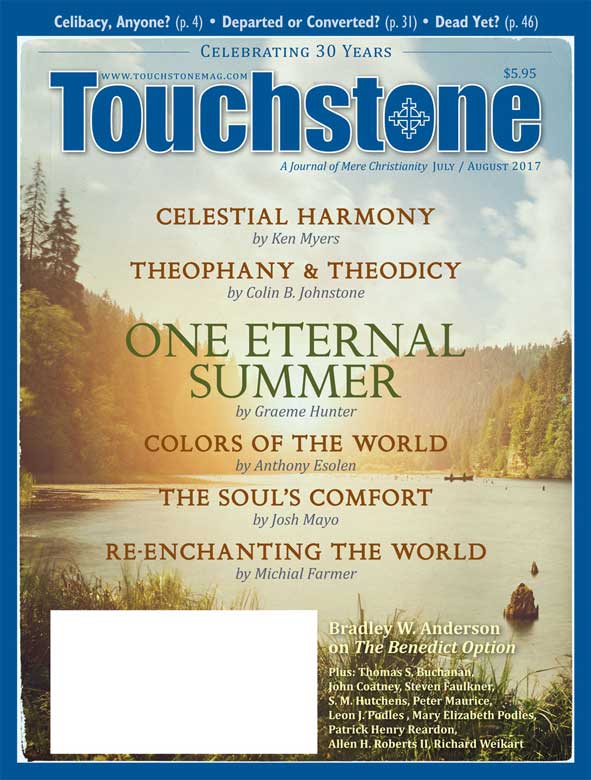Review
Secularists on Stilts
What Is a Human? What the Answers Mean for Human Rights
by John H. Evans
Oxford University Press, 2016
(272 pages, $35.00, hardcover)
reviewed by Richard Weikart
The debate has raged for centuries: Can secular philosophies provide a firm foundation for human rights, or do they rather undermine morality and human rights? In the Declaration of Independence, Jefferson famously wrote, "We hold these truths to be self-evident: that all men are created equal, that they are endowed by their Creator with certain inalienable rights, among these are life, liberty, and the pursuit of happiness." Can those who eliminate the Creator from their worldview still retain a belief in human rights?
A fascinating new sociological study by John H. Evans (University of California, San Diego) sheds new light on this old and perplexing question. His new sociological data, published in this book, provide fresh insights that should influence the direction of this debate in the future. Ultimately, this study demonstrates that secular views of humanity are less supportive of human rights than the Christian worldview.
We Christians may be tempted to declare victory, since Evans, even though he is not a Christian, seems to vindicate a significant critique of secular philosophies. Unfortunately, however, even if this triumphalism has some merit, it would nevertheless be premature, because when Evans reflects philosophically about the implications of his study, he tries to rescue the secular perspectives. He suggests that secular intellectuals simply tweak their rhetoric rather than make any substantive changes to their worldview. Thus, the debate will surely continue.
Evans notes that for a long time, critics of secularism, such as myself, have been arguing that secular philosophies undermine support for morality and human rights. (He briefly discusses my position as one example among others, though unfortunately he could not discuss my most recent contribution to this debate, The Death of Humanity and the Case for Life, since it was released after his book was in press).
Three Views of Humanity
Evans astutely identifies three main views of humanity (or anthropologies, to use his terminology) that prevail in academic discourse and are reflected in the American public: the theological, biological, and philosophical anthropologies. The theological anthropology is the Christian view that humans are created in the image of God. According to his survey, this is the view upheld by a majority of Americans.
The biological anthropology, which was upheld by about 25 percent of survey respondents, takes a more materialistic view of humans as merely biological organisms. Because it sees humans primarily as the product of random mutations over eons of time, "this anthropology portrays humans as objects" (9). A clear example of the biological anthropology is the geneticist Robert Haynes, president of the 16th International Congress of Genetics, who told that gathering that
for three thousand years at least, a majority of people have considered that human beings were special . . . it's the Judeo-Christian view of man. What the ability to manipulate genes should indicate to people is the very deep extent to which we are biological machines. The traditional view is built on the foundation that life is sacred . . . well, not anymore. It's no longer possible to live by the idea that there is something special, unique, even sacred about living organisms. (9–10)
Richard Weikart is professor of history at California State University, Stanislaus, and author of From Darwin to Hitler: Evolutionary Ethics, Eugenics, and Racism in Germany and Hitler's Ethic: The Nazi Pursuit of Evolutionary Progress (both from Palgrave Macmillan). Some of his writings can be found at www.csustan.edu/history/faculty/weikart.
subscription options
Order
Print/Online Subscription

Get six issues (one year) of Touchstone PLUS full online access including pdf downloads for only $39.95. That's only $3.34 per month!
Order
Online Only
Subscription

Get a one-year full-access subscription to the Touchstone online archives for only $19.95. That's only $1.66 per month!
bulk subscriptions
Order Touchstone subscriptions in bulk and save $10 per sub! Each subscription includes 6 issues of Touchstone plus full online access to touchstonemag.com—including archives, videos, and pdf downloads of recent issues for only $29.95 each! Great for churches or study groups.
Transactions will be processed on a secure server.
more on book reviews from the online archives
more from the online archives
calling all readers
Please Donate
"There are magazines worth reading but few worth saving . . . Touchstone is just such a magazine."
—Alice von Hildebrand
"Here we do not concede one square millimeter of territory to falsehood, folly, contemporary sentimentality, or fashion. We speak the truth, and let God be our judge. . . . Touchstone is the one committedly Christian conservative journal."
—Anthony Esolen, Touchstone senior editor










